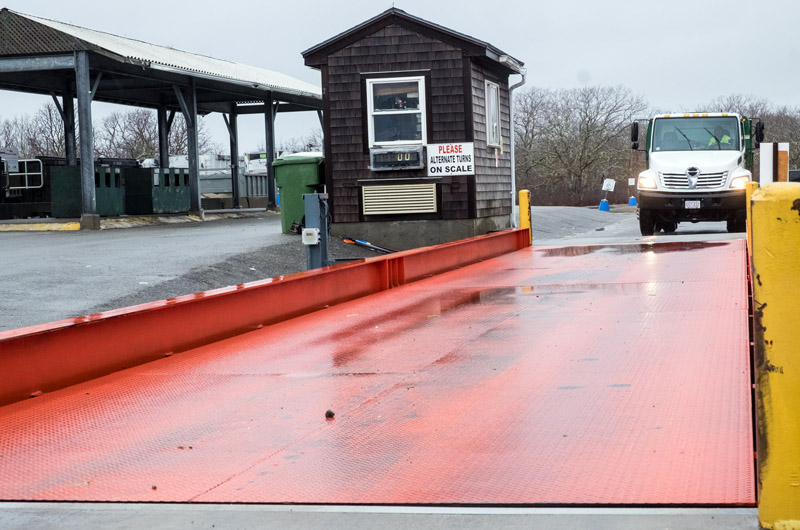For the third time in as many years, the Martha’s Vineyard Refuse District will ask member towns to approve funding to expand its central transfer station in Edgartown.
The $2.5 million project, first proposed in 2014, would more than double the station’s operational footprint of about four acres off Edgartown-West Tisbury Road. The plans call for a new access road for residential traffic, a new dropoff area for residential trash and recycling, and a second garbage scale for vehicles and commercial use.
Chilmark and Aquinnah approved the request in 2014, with Edgartown and West Tisbury following suit the next year. But the refuse district committee later discovered it had missed a 45-day window to gather town votes following its own approval in 2014, so it returned to voters again last year.
In the meantime, enough questions had surfaced during a public review by the Martha’s Vineyard Commission that Edgartown changed its mind, voting to postpone a decision on its share of spending on the project. With the project essentially dead in the water, Chilmark and Aquinnah pulled the article from their town meeting warrants last year, although it had already passed in West Tisbury.
All four member towns (Edgartown, West Tisbury, Chilmark and Aquinnah) will be asked to vote again at their annual town meetings this spring. All four need to approve the article for it to pass. Oak Bluffs and Tisbury operate their own trash district.
As before, Edgartown would pay 69.5 per cent of the 20-year bond, with West Tisbury paying 15.5 per cent, Chilmark paying 12 per cent, and Aquinnah paying three per cent.
At public hearings two winters ago, concerns centered on increased noise and visibility, and a general lack of detail surrounding the proposal. There were questions about the district’s longer-term plans for the site, given the scale of the expansion, although district manager Don Hatch said the expansion would not lead to increased use. He said a more detailed plan would rely on the $2.5 million bond for funding.
The commission closed the public hearing early last year but never voted on the plan.
Reached by phone this week, Mr. Hatch said the plans have not changed since last year and traffic congestion remains a problem at the central transfer station in Edgartown. “It’s something we really need to do,” he said of the project. He added that a yearlong food-waste study has also shed new light on the expansion plans which could include space for municipal composting.
At around the time the refuse district announced its plans in 2014, a statewide law went into effect requiring businesses producing more than a ton of food waste per week to compost or repurpose the waste. Existing facilities in the state and on the Island fall well short of being able to handle that much material, and the food waste ban has yet to be enforced.
The Island food waste study began last March with funding from the Martha’s Vision Fellowship and aims to provide a starting point for future management on the Island. As part of the study, a pilot program was launched last summer with workers collecting food waste from six participating restaurants and taking it to Morning Glory Farm in Edgartown to be composted. The pilot will continue this summer under the management of the nonprofit Island Grown Initiative.
Sophie Abrams, a West Tisbury resident who is leading the study, said in January that managing the Island’s food waste throughout the year would likely boil down to an increased capacity for composting, and recycling in the form of animal feed. Neither refuse district has composting facilities, although both have shown interest in the idea.
Mr. Hatch said the study found that composting would be essential to the Island, with the district playing a role. “So this would free up some space for that,” he said of the expansion project.
The idea is still a concept since the current expansion plan does not include a composting facility. Mr. Hatch said previously that a second phase of the project could include a building for construction and wood waste and an area for composting.
“We didn’t have an answer last year,” the refuse district manager said of the questions surrounding future uses of the site and whether they might include composting. “This is a possibility.”









Comments (4)
Comments
Comment policy »